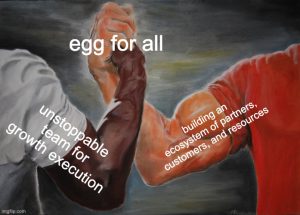In this article, VP of Investments Yongcheng Ong and senior content strategist Paulo Joquino put together a mini-case study on Float Foods‘s development of OnlyEg from 2022 leading up to its commercial launch on Earth Day 2022 and the key ingredients for the Singapore-based food tech to scale Asia’s first plant-based whole egg substitute.
Highlights
- Amidst this imbalance of demand and supply sustainability and the efforts to reduce the food supply chain risks, plant-based food tech Float Foods has risen to the forefront of driving commercialization of clean, scalable food options centering around one product in particular: the egg.
- Float Foods founder and CEO Vinita Choolani realized there was an opportunity to develop a plant-based whole egg, specifically the sunny side up with egg white and egg yolk common to many Asian cuisines. More than catering to Asian cuisines and the Asian diet, the whole egg approach has opened up OnlyEg’s applications beyond baking and omelets.
- Throughout this whole process of getting OnlyEg ready for distribution and scale, Float Foods has had a singular goal of being a 100% plant-based egg for all diets, recipes, and cuisines. But going from launch to ensuring it does get into a globally diverse set of diets, recipes, and cuisines is another challenge entirely.
Asia remains the biggest consumers of chicken eggs, with 65% of global production taking place in the region. Singaporeans consume almost 2 billion chicken eggs annually, of which more than 70% are currently imported, rendering Singapore susceptible to food supply disruptions.
Singapore aims to produce 30% of its nutritional needs by 2030, and Float Foods plans to move forward in its commitment to build a sustainable food ecosystem that can contribute towards this goal.
Amidst this imbalance of demand and supply sustainability and the efforts to reduce the food supply chain risks, plant-based food tech Float Foods has risen to the forefront of driving commercialization of clean, scalable food options centering around one product in particular: the egg.
In this article we trace the growth of Float Foods from zero to whole egg (i.e. commercial launch), and what it will take to get Float Foods from OnlyEg to egg for all.
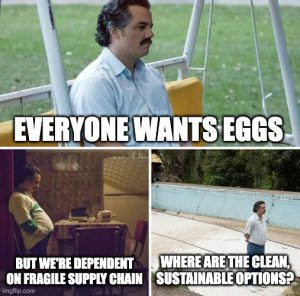
Cracking open a new venture amidst the pandemic
The year is 2020. Vinita Choolani, after nearly several years building from the ground up and scaling a leading women’s healthcare biotech company in Singapore, was on the cusp of her next venture.
In her previous company, while the focus was on diagnostics technology, the seeds were planted of perhaps going beyond the patient journey entirely and focusing on preventative healthcare like nutrition, immunity, and therapeutics. Going into a new venture was an opportunity to finally explore this, though the scope was still vast.
Things narrowed down for Vinita when the pandemic struck and supply chains initially blocked access to basic staples like eggs, dairy, and cheese. As she recalls on our podcast, “At that time, it was actually very palpable. You feel like you’re in a siege because you can’t have access to basic, everyday staples. And so that got me thinking and I said, “I’m a Singaporean. And I was born here. What can we do to change this?”
She zero-ed in on plant-based alternatives that would allow Singapore to produce its own goods and reduce its dependence on and exposure to global supply chain fragility. She looked at alternatives for milk, cheese, and eggs, and decided to work on eggs.
For one, when it came to plant-based alternatives, prior to the pandemic, it was largely dominated by meats, and even then there weren’t a lot of choices. Plant-based milks and cheeses had just begun to come into the scene and gain attention. When it came to eggs, while there was already an existing player in the market by 2020, they were just focused on scrambled eggs, catering mainly to Western diets. Vinita realized there was an opportunity to develop a plant-based whole egg, specifically the sunny side up with egg white and egg yolk common to many Asian cuisines.
As she explains on our podcast, “In Asia, we’re very used to our sunny side up. We are used to having [that on] fried rice or nasi lemak and so on. And I felt that [the existing product] wasn’t really suited to our culinary tastes, preference, and our culture, so I thought, “Hey, there’s a gap here. Let me see what I can do in that area.” So that was really how I kind of segued into that Asian egg concept.”
With this realization, there was an opportunity to not only change the options Singapore has when it comes to food, but also develop a product to improve food nutrition as well, going back to her interest in preventative healthcare while scaling her previous venture. And so began Singapore-based plant-based company Float Foods.
From Zero to Whole Egg
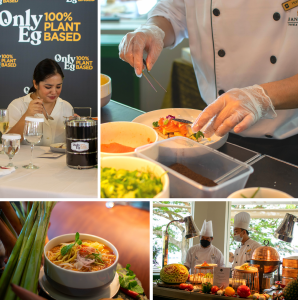
OnlyEg at Shang Event (from OnlyEg LinkedIn)
Two years later on Earth Day, Float Foods officially launched its flagship brand OnlyEg and first commercial SKU / product, the OnlyEg shreds. OnlyEg is the first of its kind to achieve a level of likeness to a real whole chicken egg — again, that means replicating an unbeaten egg with yolk intact, setting them apart from their liquid egg substitute blend peers.
The Whole Egg-verse
More than catering to Asian cuisines and the Asian diet, the whole egg approach has opened up OnlyEg’s applications beyond baking and omelets. Major categories of these applications include the whole egg itself (e.g. white, yolk, fried), ready-to-eat (e.g. shreds (their first commercial product!), patties, tamago), powder (e.g. baking, premix), flavorings (e.g. sauces), and artisanal (e.g. egg pasta).
Taste and Nutrition as the Priority
In developing Asia’s first commercial plant-based whole egg, Float Foods prioritized two things: taste or more broadly, the sensory experience of the egg (which includes texture, smell, and appearance as well). “That is the first point with the consumer so that they don’t have to make any sacrifice for their enjoyment,” explains Vinita.
The second priority, going back to Vinita’s itch to develop preventative healthcare solutions, was to focus on the nutritional profile. The company worked closely with Singapore-based research institutions, which enabled them to not only match the nutritional standards of the natural chicken whole egg but optimize for even higher protein content in the egg white component. In certain applications, Float Foods was able to lower the cholesterol level as well. Achieving this in the lab, Float Foods submitted a patent for the egg white. In addition, the company’s products are free of Salmonella, a disease that poses serious health risks and can force egg production farms to be shut down. Achieving this in the lab, Float Foods submitted a patent for the egg white.
It Takes a Village
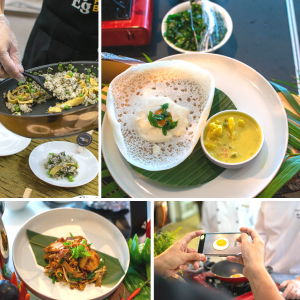
OnlyEg at Shang Event (from OnlyEg LinkedIn)
Getting OnlyEg from zero to one and ready for commercial launch was not just about developing a plant-based whole egg in the lab. It involved several collaborations and iterations with chefs and restaurants, scientists and labs, and even taste tests with investors — one of which eventually led to Vinita meeting Insignia Ventures!
As Vinita shares on our podcast, “So we had numerous trials [where] there is a lot of tweaking. There [are] a lot of sensory evaluations. We work with polytechnics. We work with universities. We try to get objective feedback and give them blind taste tests. We do a lot of sensory evaluations with them to get as much feedback as possible.”
“Similarly with chefs, we send [samples] out to chefs. We get feedback from them, so we’re trying to make sure that we get a very wide spectrum of responses and feedback and evaluation that can really help us to improve our formulations and things like that.”
It’s worth noting that these collaborations and the growing network of Float Foods that began with OnlyEg’s development will be foundational as they scale its commercial adoption.
Prior to launch they also made sure to get OnlyEg halal certified, and even applied for a global foodtech award which their OnlyEg white received.
From Egg to Egg for All
Throughout this whole process of getting OnlyEg ready for distribution and scale, Float Foods has had a singular goal of being a 100% plant-based egg for all diets, recipes, and cuisines. But going from launch to ensuring it does get into a globally diverse set of diets, recipes, and cuisines is another challenge entirely, and we zero in on four key aspects that will be important for Float Foods as they go from egg to egg for all:
- Production: Flexibility of Plug-and-Play
- Distribution: Localized Partners to go Global
- Cost: Price Parity is the Key to Both Scale and Profitability
- Branding: The Foundation for Global Distinction
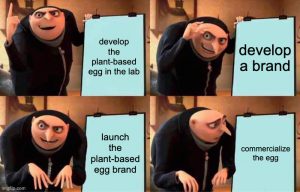
(1) Flexibility of Plug-and-Play
Compared to established companies, Float Foods doesn’t have as much of an easy access to manufacturing facilities to set up entirely from scratch, compared to more established companies. Instead they’ve gone to find flexible plug-and-play production plants. In recent years there are a few that have opened up in Singapore.
As Vinita describes plug-and-play on the podcast, “Recently there have been a couple of plug-and-play set-ups that have opened up in Singapore. We’ve gone to speak to them. You walk in and they have 10 different kinds of equipment ready to rock and roll. So the question is for us to figure out how do we use this and how do we use that and how to do upstream and downstream and match the two so that it’s seamless [and] so it’s starting to take shape?…A lot of movement recently in that area from when we started a year and a half ago. So I think in time, it’s going to be plug-and-play.”
Recently, along with their patent application for the OnlyEg white, Float Foods also announced securing a plant. As quoted on an article, “The Hersing Kitchen location provides over 4,000 square feet of production capability. An R&D laboratory will be housed alongside manufacturing lines, which will be used to produce OnlyEg in its various guises.”

(2) Distribution: Local and Collaborative
If it isn’t clear yet from Float Foods’ story, being in Singapore as a plant-based startup has enabled them to speed up development and hit the ground running on commercialization in a way that may have been an entirely different story in other markets.
Singapore as a key launchpad
From the plug-and-play set-ups we have just discussed, to research institutions like A*Star that supported their protein optimization, to academic institutions that helped them iterate and test, to EDB providing incentives for ESG initiatives, to restaurants open to trying plant-based alternatives, and the presence of a pool of investors interplant-based interested and talent — all of this has made Singapore the perfect launchpad for Float Foods.
And it certainly helps that this isn’t Vinita’s first rodeo scaling from Singapore to other markets. In her previous healthcare company, she lead the company to scale adoption of biotech products across six markets in two years. Vinita was already aware of the unmatched infrastructure and collaborative ecosystem she could tap intoon in the city-state.
As Vinita explains on the podcast, “During INEX (her previous venture) I realized, [Singapore] is a gold mine and we should be tapping into this to our advantage. So, what I learned from there also set the stage for when I set up Float Foods.”
“And I very quickly leveraged all these infrastructural support that we could get, whether funding or non-funding, whether it was expertise, whether it was R&D, whether it was infrastructure plug-and-play, moving into an all-ready lab, on all fronts.”
“It was actually really, really easy and it allowed us to really focus on product. And that was really quite something else. I can’t say this enough that we’re very, very lucky. The best place to start a businesses is in Singapore.”
B2B-first to unlock industry and seamlessly win consumer taste buds
And so when it comes to distribution, building upon the network of chefs, restaurants, distributors they had worked with in the iteration / development / beta phase will be key to getting off to a good start from Singapore.
Compared to the B2C approach that many are familiar with thanks to the media, key to plant-based success is being able to seamlessly integrate the innovation into existing menus and cuisines. That means B2B commercialization, working with top distributors, engaging with KOL-type chefs and selling to HORECA partners.
B2B-first is important to gain the approval of the larger incumbent industry while also dipping into the taste buds of consumers. It almost serves as a lubricant to drive modern trade and B2C distribution. That said, B2C is already available (see OnlyEg’s website).
Local partners to go global
The “Egg for All” can’t just stay in Singapore or even just Southeast Asia, of course. Float Foods will have to replicate, to varying degrees, the same strategy of finding local partners, KOLs, institutions across their target markets (especially the US and Europe) to land sustainably.
As Vinita mentions on the podcast, “So we’re looking for partners in the US market and the UK market. if they have strategic infrastructure in place for distribution, we would love to reach out to them. We already speaking to some of them in the US and UK, but that is the way for us to go.”
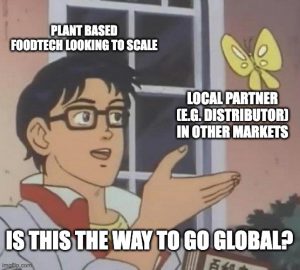
(2) Pressure is on for Price Parity
OnlyEg may have the taste down and the nutritional value beating even the natural whole egg, but if cost isn’t accessible, even the most aware and eager consumers may find it difficult to bring plant-based products into their diet.
Costs tend to go down over time, but catalyzing price parity is another challenge altogether
As Vinita shares on the podcast, “I do believe actually that in Singapore, the millennials are particularly ready more than those in the older generation. I do think however that price would be a very key component in their decision-making.”
“They’re very much aware of the climate crisis, the sustainability and the environmental issues, and they actually want to take ownership to try to help and do their part in terms of their conscious consumption. But I think price will be a big obstacle for them.”
In general, and over time, prices for new innovations typically go down (or the product goes off the shelves eventually), and for plant-based cheeses and milks in Singapore, the prices came down, but still not enough to match the prices of the traditional option.
The pressure to reach price parity is even greater for eggs because as Vinita explains, “We’re in a different position than meat because with meat already you have a preconception that you’re paying a premium, but for eggs, the perception is I can’t pay twice or even three times more, even though it’s healthier and it’s better for you, with no drugs, no antibiotics, no cholesterol, but still there is some resistance I think…price will be the biggest barrier to mainstream adoption. The minute we hit that price point, then I think we’re going to be very good.”
It doesn’t help that as Float Foods looks to scale the world is coming off supply chain challenges. This makes the previous points on manufacturing and distribution all the more important: flexible options and local partnerships will be the keys to drive down costs.
The key to scale is ALSO the key to profitability
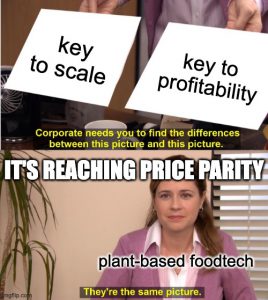
Ultimately price parity will be key to Float Foods achieving profitability as a venture-backed plant-based food tech. While Singapore has afforded the company speed and quality resources, it has also come at its own price. So for the plant-based company, it’s all about striking a fine balance.
As Vinita illustrates, “The fact is Singapore is expensive, but yet the quality, the reputation, the standards, is unmatched. So, you’ve got to have to pay a premium for quality, that’s [the bottomline]. So our challenge is to what extent will consumers pay for quality? And to what extent can we give them value for money? So that’s where really we need to find that sweet spot.”
And at the end of the day, selling an expensive egg just beats the whole essence and purpose of Vinita starting Float Foods in the first place, amidst the inaccessibility of basic goods in the pandemic.
“We are working very hard because I’m very, very mindful of the fact that we do not want to put up an expensive egg. We want to put out a very good egg, the better egg, but not an expensive egg, because that’s not what we had set out to do. So every thing that we do, it’s guided by that principle. So if we have to make decisions, we will make the decision based on the fact that our consumer [should not] have to be spending tons of money on [buying] their eggs.”
(3) Branding is what unifies everything
Tying up all these previous elements for Float Foods to scale OnlyEg globally is its branding. The composition and nature of the product itself already opens up a lot of opportunities. Eggs are a staple across cultures, eaten at all times of the day. Whole eggs, in particular, can be more easily “reformatted” or “integrated” into various dishes.
Thus the manufacturing piece has to keep up with the accessibility, distribution has to be widespread to leverage the diverse applications of eggs, and the costs have to be low enough to enable it to become a daily habit or easily accessible.
Vinita shares on the podcast, “Our positioning has got to break through the noise, so we want to be the egg for all. We want to be the egg that is for all diets, all cultures, all cuisines, all times of the day.”
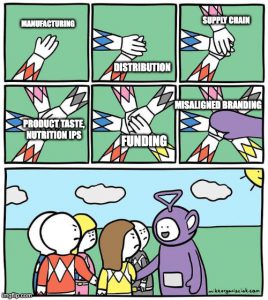
Egg by All, for All
The foundations for a plant-based food tech to scale are not out-of-this-world. In fact these could very much apply to many businesses looking to commercialize globally. What sets Float Foods and many other food techs’ situation apart is (1) the very nature of the product being both familiar (many people eat eggs) and unfamiliar (not nearly as many people eat plant-based) to the global market, (2) the combination of inherent constraints and pace as a startup, and (3) the diversity in ecosystem components for plant-based adoption in various markets (e.g. Singapore is more on the supportive side when it comes to plant-based).
So even with these ingredients for commercialization, and even the roads already paved by the likes of Impossible and Eat Just, it will come down to execution, and behind that execution needs to be a team that Vinita believes is rooted in shared relentless determination.
“Even in INEX, we were a very small team to begin with, obviously now it’s a very large team, but at that time we had a very small team and we had to open up seven markets in two years, which was — hop on a plane and go there, do the presentations, sell the product, come back, follow up. So the team that I [formed] then, and even here, has the same DNA, right. Attitude is can-do [and] basically that’s the bottom line, the can-do and will-do 24/7.”
And apart from an unstoppable team, making OnlyEg the “egg for all” will take a lot of collaboration. Even the two year journey of getting OnlyEg from ideation to commercial launch took many different groups from labs to universities, restaurants, government institutions, investors, and many more.
With an unstoppable team and a growing ecosystem supporting the adoption of OnlyEg, Vinita’s hunger for OnlyEg to go beyond Singapore and global has only become stronger. “In the next five years, we will be the OnlyEg that has many formats, is versatile, and is an egg for everyone and every cuisine. We will be able to give you eggs for your sandwiches, for your noodles, for your rice, for your ramen, for baking, for your cakes and so on. So we’re planning to do all of that in the next five years, and I’m pretty sure we’re going to set it up successfully.”
